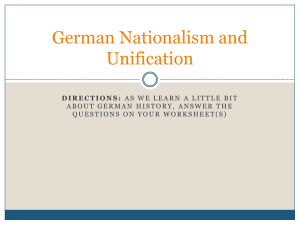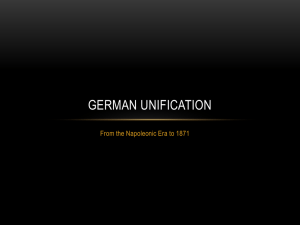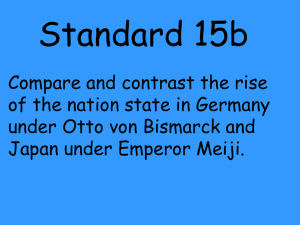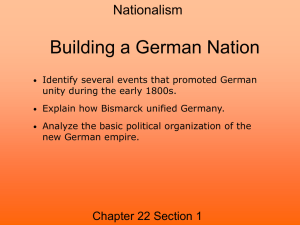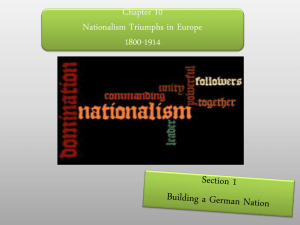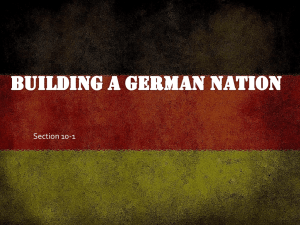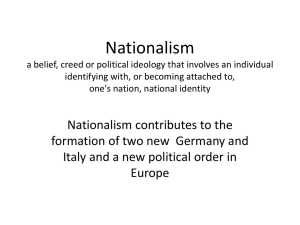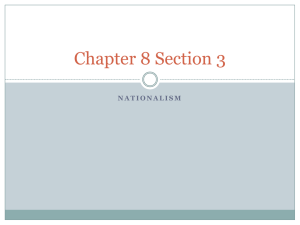and “Realpolitik” lead to the unification of Germany?
advertisement
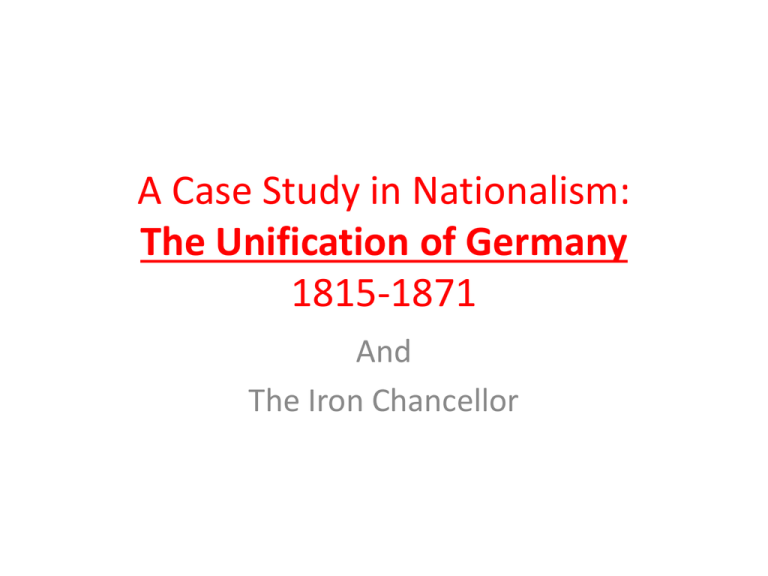
A Case Study in Nationalism:
The Unification of Germany
1815-1871
And
The Iron Chancellor
Emergence of German Nationalism
• In the Holy Roman Empire, the German states were a
loose confederation of roughly 300 states
• Confederation/Federation = A union of self-governing
states united by a central government
– For the Holy Roman Empire, there was an emperor who
came from one of the states
– This style of unionship was popular to the Germanic
peoples
• Fiercely independent and proud of their culture and heritage
– Can anyone think of a modern example?
Emergence of German Nationalism
• Under Napoleon’s Empire, German nationalism
thrived in the newly re-organized German States
– From 300 to 30 states (still a confederation)
• Note the greater efficiency in governance
– People began to argue that “Germany” should be
identified as a single state
– Napoleon represented a strong leader, and the Germanic
people were willing to follow
• However, Napoleon’s assault on Russia disillusioned
the German people
– About 125,000 German soldiers died in that assault
Emergence of German Nationalism
• “The first, original, and truly natural boundaries of states are beyond
doubt their internal boundaries. Those who speak the same language are
joined to each other by a multitude of invisible bonds by nature herself.
Long before any human art begins they understand each other and have
the power of continuing to make themselves understood more and more
clearly; they belong together and are by nature one and an inseparable
whole” – Johann Gottlieb Fichte, 1764-1814
• To Fichte, what is the most important understanding
of nation?
German
Confederation
with the
Congress of
Vienna
1) German States
2) Austria
3) Prussia
Nationalities within the
Hapsburg Empire
Emergence of German Nationalism
The main dilemma for German unification is whether Prussia or
Austria would form the core of the new political structure
Prussia
Austria
• Almost entirely German
speaking
• Very conservative
(politically) in nature
• A very multi-ethnic and
diverse area
• Was a part of the Hapsburg
Empire
Who do you think will win out?
Otto von Bismarck:
“The Iron Chancellor”
• Born 1815 and died 1898. Part of
a noble family
• He served as the president of
Prussia from 1862-1890
– Note: he still served under kings
• He then served as the First
Chancellor for the unified
Germany from 1871-1890
• He is known for being very
conservative, yet a pragmatic
leader
Otto von Bismarck:
“The Iron Chancellor”
• Blood and Iron Speech
“…Prussia must concentrate and maintain its power for the favorable moment
which has already slipped by several times. Prussia’s boundaries
according to the Vienna treaties are not favorable to a healthy state life.
The great questions of the time will not be resolved by speeches and
majority decisions – that was the great mistake of 1848 and 1849 – but by
blood and iron”
Blood = represents the ethnic German people
Iron = represents military power
Otto von Bismarck:
“The Iron Chancellor”
• Bismarck had a dream to see the German States
unified into one great nation
• In the 1860’s, Bismarck used diplomacy and the
Prussian military to create a unified Germany which
included:
– Prussia (the dominant power)
– The German Confederation
• Austria was excluded however – Bismarck did not
want to share power with Austria, and Austria did
not want to share power with Prussia
Realpolitik
• How could Bismarck, a staunch conservative politician
achieve such wide-ranging success and approval?
Realpolitik
– German Translation: real; practical; actual
– A philosophy of making realistic and achievable promises, rather
than ideological or ethical promises
– Only make promises you can keep!
• For example: Bismarck encouraged trade with the
southern German States (Austria…) even though they
were essentially enemies. This won the support of his
opponents
The Story of
Unification
How did Bismarck’s philosophy
of “Blood and Iron” and
“Realpolitik” lead to the
unification of Germany?
• Read the notes on the
following slides, and be
prepared with an answer for
tomorrow
• Compare your answers with
your peers
Defeat of Denmark
• In 1853, there was a crisis of succession in Denmark,
and several territories faced questions of rulership
• Bismarck issued an ultimatum that the territories of
Schleswig be allowed to remain independent due to
many German-speaking people living there
– The Danish monarch, Christian IX refused
• So Prussia and Austria invaded and defeated the
Danes
– Prussia received Schleswig
– Austria received Holstein
Defeat of Austria – the Austro-Prussian
War
• In 1855, a conflict emerged between Prussia and
Austria over Holstein and Schlesweig
• Bismarck occupied Holstein which prompted Austria
to declare war
• To the surprise of Europe, Prussia quickly defeated
Austria
• This resulted in the creation of the North German
Confederation
– Bismarck wanted to ensure Prussia’s dominance, thus
Austria was excluded from this confederation
Franco-Prussian War 1870-1871
• A vacancy in the Spanish throne was contested. Bismarck
supported a German king, but was blocked by Napoleon
III, the king of France
• Through clever political manipulations, Bismarck got
France to declare war on Prussia
– With France as the aggressor, the German states were eager to
aid Prussia in fighting France
– Careful political manipulations also ensured that the other
European states would not help France
• German military generals wanted to require France to
surrender defensive territory to Prussia, however
Bismarck opposed the annexation. Why do you think he
did this?
The Story of
Unification
How did Bismarck’s philosophy
of “Blood and Iron” and
“Realpolitik” lead to the
unification of Germany?
• So what is your answer to the
question above?
• What do your peers think?
• Be ready to share tomorrow
• Also, answer the question on
slide 16
Quotes by Bismarck
• A government must not waver
once it has chosen its course.
It must not look to the left or
right but go forward.
• Be polite; write diplomatically.
Even in a declaration of war
one observers the rules of
politeness
• Anyone who has ever looked
into the glazed eyes of a
soldier dying on the battlefield
will think hard before starting
a war
• There is a providence that
protects idiots, drunkards,
children, and the United States
of America
• When a man says he approves
of something in principle, it
means he hasn’t the slightest
intention of carrying it out in
practice
• Whoever speaks of Europe is
wrong, it is a geographical
expression.
German Unification
Summary
• First – the coming together of the German Confederation
and Prussia to form the North German Confederation
• Second – the Austro-Prussian War in which Prussia
emerges victorious, and gains Austrian lands. Austria is
prevented from joining, even if they wanted to
• Third – the Franco-Prussian War in which Prussia
defeated France and annexed some French territories.
The European powers had no idea how to respond!
Creation of a GERMAN EMPIRE
Governance within the North German
Confederation
• The North German Confederation had its own
legislature called the Reichstag
– The King of Prussia, William I became its president
– Bismarck became its chancellor
• Notice the presence of some ideas of parliamentary
session – however, power was centralized and
Bismarck essentially held all of the power
Governance within the North German
Confederation
• With the defeat of France, the North German
Confederation was declared the German Empire
– William I of Prussia was declared emperor
– Bismarck remained chancellor (de-facto ruler)
– The government remained highly centralized and autocratic. The
middle classes did not participate in it (unlike Britain, France,
and Italy {which had recently unified as well})
• Notice the term changes:
– Confederation -> president
– Empire -> emperor
Key Ideas
• Concept of Federation
– Germany is unique in that it was formed based on the idea of a
political system unifying independent and self-governing states
• Conservativeness
– The central government remained highly autocratic and resisted
many of the new political ideas of liberalism at the time
• Ethnic Ties
– For Bismarck’s Germany, and the German people, the German
language and heritage was vital. Hence, the desire for the
French territories of Alsace and Lorraine to become part of the
German Empire
• This was coupled with a strong military presence and tradition
Key Words
•
•
•
•
•
•
•
•
•
•
Confederation/Federation
Otto von Bismarck
Iron Chancellor
Blood and Iron Speech
Realpolitik
North German Confederation
Reichstag
Austro-Prussian War
Franco-Prussian War
German Empire
